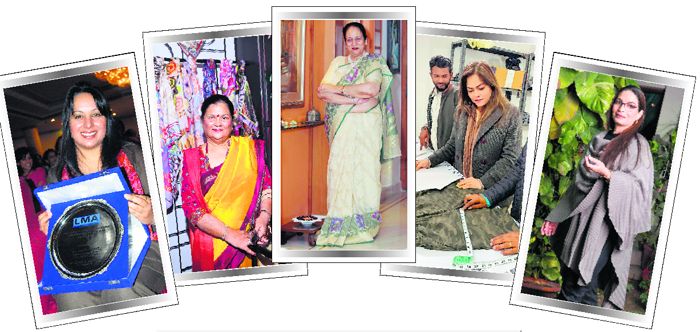
From left: Sandeep (Minnie) Riat, Mridula Jain, Rajni Bector, Meenakshi Jasuja and Ruby Marjara.
Renu Sud Sinha
Rajni Bector was a BA second-year student at Miranda House in New Delhi when she got married in 1957 into a prominent Ludhiana business family. She was yet to turn 18. Born in Karachi in a family of bureaucrats, her role in her new family was well defined — she had no role. Like her mother-in-law, what she was expected to do was to join the ranks of a well-rounded support system. To keep herself busy, she started taking cookery classes, an activity she excelled in and enjoyed. Her mother-in-law could not wrap her head around why a ‘rich Ludhiana wife’ would want to work, so the young daughter-in-law did not touch a rupee of what she earned; all went to charity. Appreciation of her culinary and management skills inspired confidence, and her husband in particular saw business potential in her ‘part-time indulgence’. She had found her role. Today, she is a role model.
Founder and chairman of Mrs Bector’s Food Specialities Limited, the Padma Shri bestowed on her this year for contribution to trade and industry comes on the heels of a bumper IPO showing — oversubscribed 198 times; a nearly Rs800-crore empire that started as a backyard business.
Mridula Jain, Sandeep (Minnie) Riat, Meenakshi Jasuja, Ruby Marjara and scores of other women entrepreneurs in the city may draw inspiration from the matriarch of Ludhiana Inc, but their stories are no less inspiring, no less revealing of the fact that inheritance or family name counts only if you succeed. And each success story has its own failures and setbacks. For a woman, the odds simply multiply, but through it all, a common thread is the unstinted support of the immediate family — the husbands, the sons and daughters, the siblings, the parents.
Rajni Bector can’t thank her husband enough for his unflinching belief in her abilities. Mridula Jain of Shingora Textile Ltd’s initial foray may have been an extension of her husband’s business, but Shingora shawls is her baby alone. Meenakshi Jasuja was a housewife who didn’t want to be known as just “Mrs Jasuja”. She wanted an identity of her own — and one she could be proud of. With initial help from her husband, she started her own label of T-shirts, sweatshirts, etc. nearly a decade ago and now supplies to major chains.
Audacity of hope
For these three ladies, starting their own business was a matter of choice. However, there are those who were compelled by circumstances to take the deep dive. Sandeep (Minnie) Riat’s has been one such gritty story. “I was born with a silver spoon, came on road, but got the silver spoon back by my sheer determination,” says the managing director of Akal Springs, manufacturer of automotive components.
A graduate in business management, Minnie was all of 21 when her father died in 2004, leaving her a debt-ridden company, nearly 50 court cases, an army of creditors to wade through and a family to look after. But he also left her a legacy of steely determination and a never-say-die spirit. It took her four years to clear the financial mess through sheer willpower and perhaps a foolhardy courage, as there was no help from any quarter. Her relatives wouldn’t touch her with a bargepole; seven banks had shown her the door, with two of them telling her plainly that they could not risk a loan to a woman.
Besides her three siblings, only her father’s old workers stood by her, working with almost no wages initially. Minnie sold off a part of her property to settle her debt, shifted her plant and was finally able to convince one bank for a loan. Today, Tata Motors and Mahindra & Mahindra are among her clients and she exports to almost all major countries, including the US, Canada, Japan, Russia and Australia.
From a pariah to an award-winning entrepreneur, her survival-to-success story is being taught as a case study in two business schools. Anyone listening in Bollywood?
Ruby Marjara, who has her own knitwear label for women called Waves, is another such destiny’s not-so-favourite child. Daughter of a business family and married into another, for Ruby, a post-graduate in textile design, being financially independent was the core of her being. Work wasn’t just worship, it was passion. Steeped in Ludhiana’s conservative milieu, her new family could not comprehend this fierce necessity to work. However, her resilience and husband’s tacit support saw her through the resistance.
In 2000, when the family business hit a rough patch, it was Ruby and her various activities that kept the family afloat. With survival at stake, Ruby took on all sorts of work — from holding lifestyle exhibitions to selling life insurance, no job was too menial for her. In 2004, she launched Waves. In 2010, she started the Yellow Tree, a premium fashion and lifestyle biennial event, something the socialites of the city look forward to. The passionate workaholic acquired Kilol’s franchise in 2018. “From being made to feel guilty for working to being called the pride of the family, perceptions and expectations have surely changed drastically,” says Ruby.
What the city offers
But where does the confidence come from? Does Ludhiana have this inbuilt ecosystem of business sustainability, a positive energy that keeps one going? Industrialist SC Ralhan, former president of the Federation of Indian Export Organisations, agrees. “The city offers great opportunities.” But does it offer similar chances to women entrepreneurs too? The veteran businessman’s response is pragmatic: “It is surely easier for women from business families than those from non-business background.”
Minnie offers a different perspective. According to this hardy, self-made entrepreneur, “The city had never been a hindrance to anyone who wanted to grow wings. Men or women, it offers a level-playing field. If you are willing to work hard, stretch your limits and scale up, then up is the only way to go.”
Her super senior in the business world, Mridula Jain concurs. Married at 21, Mridula, a science graduate, had to opt for BEd at her mother’s insistence. Two kids in quick succession limited her options to home coaching for 10 years. But as this daughter and daughter-in-law of a business family says, “Entrepreneurship is part of our culture.” With kids grown up, Mridula wanted to step out of home. A chance remark by her nephew gave her an idea and Shingora shawls was born. From a utility item, Shingora (derived from Hindi word shringar meaning ornament) made shawls a fashion statement. Starting with eight handlooms and eight weavers, the business now employs nearly 1,000 workers. With Shingora growing at a mercurial speed, her husband and sons have joined her.
Shawls is not the only thing that Mridula has restructured. She has given shape to the shawl industry in the North. She formed the shawl manufacturers’ association, tied up with Wool and Woollens Export Promotion Council for export of shawls. And when exports grew, necessitating more production, she crusaded for an amendment in law that allowed for import and use of power looms in India. She admits with justified pride, “Much of the amendment had been worded by me.”
However, not everything has been hunky dory in the male-dominated business scene of the city. Many women entrepreneurs have faced numerous challenges — condescending behaviour by contemporaries, lack of credibility about deliverance, a sullen, unresponsive male workforce, delayed payments, cheating agents.
When Meenakshi started work in 2009, for the initial two years the workers in the workshop made her life miserable — not taking her orders seriously, shoddy workmanship, under-deliverance. Exasperated, she fired the whole lot and started afresh. While things have been better since inside the workshop, unprofessional behaviour, bordering on chauvinism, by field agents in northern states of UP, Haryana, Punjab, even the North-East, has made her resolve to only work with brand stores in the South.
This patriarchal mindset may have been a reason why the number of women entrepreneurs has remained miniscule, feels SS Bhogal, a veteran industrialist. There are other factors too. In a city dominated by small and medium enterprises, a lack of technical education and, of course, conservative mentality that women should not be on the forefront may be responsible for these small numbers.
Vinod Thapar, chairman of the Ludhiana Knitwear Club, agrees. “There was no appreciation or acceptance of women in the city’s business scenario. But things are changing slowly now.”
He is not off the mark. The winds of change can be felt. While this lot of women entrepreneurs may have faced a tough trek, they are making sure their daughters and daughters-in-law, as well as other women, are not left behind. Mrs Bector’s daughters-in-law and granddaughters-in-law are active stakeholders in her business. Both of Mridula’s daughters-in-law are working with her, as is Ruby’s daughter-in-law. Thapar’s own daughter, Sharadha, married into a business family, has turned around a sick cycle unit into a profitable one.
Ludhiana Inc has a distinct women link, and they mean business.
|
|
|
|
Join Whatsapp Channel of The Tribune for latest updates.






 "It is easier for women from business families to start their own venture than those from a non-business background." — SC Ralhan, former president, the Federation of Indian Export Organisations
"It is easier for women from business families to start their own venture than those from a non-business background." — SC Ralhan, former president, the Federation of Indian Export Organisations "There was no appreciation or acceptance of women in the city’s business scenario. But things are changing slowly now." —Vinod Thapar, chairman, Ludhiana Knitwear Club
"There was no appreciation or acceptance of women in the city’s business scenario. But things are changing slowly now." —Vinod Thapar, chairman, Ludhiana Knitwear Club "A patriarchal mindset may have been a reason why the number of women entrepreneurs has remained miniscule." —SS Bhogal, former vice-chairman (northern region), Engineering Export Promotion Council of India
"A patriarchal mindset may have been a reason why the number of women entrepreneurs has remained miniscule." —SS Bhogal, former vice-chairman (northern region), Engineering Export Promotion Council of India




















